As re-stated by Rabbi Yair Hoffman lz”n Reb Tzvi Dovid ben Reb Moshe
Wow! We are so wonderfully blessed to have in our midst Gedolei Torah, such as Rav Yeruchem Olshin shlita, who can tell us what we need to hear This piece truly tells it like it is. It is from a Vaad given last year.
Introduction
In Parshas Vayeitzei, on his way to Lavan’s home, to escape the clutches of his brother, Eisov, Yaakov Avinu makes a vow. As part of that vow he asks Hashem, “v’nosan li lechem le’echol u’beged lilbosh” – to give him bread to eat and clothing to wear.
In explaining these words, the Kli Yakar writes that the way to protect oneself from sin is to be sure not to learn from the ways of the reshoim. However, adds the Kli Yakar, there is another way as well. And that is understanding that, “osher ham’aver einei be’olov u’moneia es ho’odom min haderech hayoshor.” The understanding that riches blind one’s eyes and prevents him from following the derech hayoshor.
The Request for Basic Necessities
In fact, adds the Kli Yakar, it’s no wonder that Shlomo Hamelech asks Hashem in Mishlei (30), “reish v’osher al titen li hatreifeini lechem chuki” – Give me neither poverty nor wealth; provide me my allotted bread.
It was that same request that Yaakov Avinu made. He asked Hashem not to give him gold and jewels. Only “lechem kedei le’echol u’beged kedei lilbosh” – bread in order to eat and clothing in order to dress. He asked for only necessities. No luxuries.
Wealth is One of the Greatest Tests in Life
Yaakov Avinu knew that one of the greatest tests in life is wealth. As the Torah says, it can lead to, “v’rom levovecho v’shochachto es Hashem Elokecha.” It can cause a person to stray from Hashem. And he, therefore, tells Hashem, “I don’t want wealth. I don’t want riches. I only want the minimum. I only want necessities.”
The Precision of Language
In fact, says the Kli Yakar, with this we can understand why Yaakov Avinu asks for, “lechem le’echol u’beged lilbosh” – bread to eat and clothing to wear. Why must he say, “bread to eat and clothing to wear”? Couldn’t he just have said, “v’nosan li lechem u’beged?”
Would any of us have thought that the bread was for wearing and the clothing was for eating?
Not More Than What is Necessary
Rather, says the Kli Yakar, Yaakov Avinu was specifying that he didn’t want any more food than was necessary for eating. Nor did he want any clothing that wasn’t necessary for dressing. Because Yaakov Avinu knew that by avoiding luxuries – by keeping to necessities – he could avoid sin.
It is for that reason that he followed these words by asking, “v’shavti b’sholom el beis ovi” – and I will return in peace to my father’s home. Yaakov Avinu knew that it was his avoidance of luxuries that would enable him to return in peace – without sin – to his father’s home.
The Connection to Sukkos
While the Kli Yakar is teaching us that Yaakov Avinu was worried that the nisayon of wealth would lead him away from Hashem, perhaps, there was another reason why Yaakov Avinu asked for only the necessities and no luxuries. However, let us first begin with another question:
As we know, the Tur tells us in Hilchos Rosh Chodesh that each one of the sholosh regolim corresponds to another one of the Avos. Sukkos that corresponds to Yaakov Avinu. As the posuk says, “ul’mikneihu osoh sukkos.’ While the Tur, indeed, brings a posuk to prove this idea, there must, be a further connection between Yaakov Avinu and Sukkos – something about the root of Yaakov’s particular Avodah that connects him to Sukkos.
What exactly is that connection?
The Story of Yonah
The answer may be in he words of the Vilna Gaon in his comments on Yonah. In Sefer Yonah (4) the posuk tells us, “And Yonah went out of the city, and he sat on the east of the city, and there he made himself a sukkah and sat under it in the shade until he would see what would happen in the city.”
In explaining this posuk, the Vilna Gaon writes that when Yonah saw that Hashem had not listened to his tefillos and time was running out, he went to the outskirts of the city, separated himself from Olam Hazeh, and sat down to learn Torah.
The Meaning of the Sukkah
With this in mind, the Gaon then explains why the posuk then says, “vaya’as lo shom sukkah vayeishev tachteho batzeil” – And he made there a sukkah and he sat underneath it in the shade.
There are two very crucial requirements that the sukkah has:
- Firstly, the posuk says, “b’ospecha migornecha u’miyikvecha.” The schach must be made of, “psoles goren v’yekev” – the waste products that come from the threshing floor and the vat.
- Secondly, there must be more shade than sun. In fact, as Rashi tells us in Sukkah, “al shem hatzeil nikra sukkah.” The very essence of the sukkah is the shade.
The Symbolism of Shade
However, says the Vilna Gaon, these two halochos teach us a fundamental principle. All of Olam Hazeh – the entire material world – all its wealth and all its goodness – are all “min hashemesh.” Much like the sun is “omedes b’mazolos,” so is the material world dependent on one’s mazal. By telling us to sit in the shade that is made from the simplest of things – “psoles goren v’yekev,” the Torah is teaching us not be drawn after materialism.
Make your sukkah out of the waste of the goren and the yekev. Benefit only from the psoles of the goren v’yekev. Separate yourself from the riches of this world. Sit in the shade. Avoid the sun.
Avoid materialism and sit in the shade of the Torah. “Vihi Torascha keva u’melachtecha arai.” Make your Torah permanent and your work temporary. That, says the Vilna Gaon, is the meaning of, “tzilsah merubah meichamasah.” And that is why Yonah built a sukkah and sat in the shade. He sat in the “shade” of ruchnius, involving himself in nothing else, waiting to see if his mazal would change.
The Foundation of Life’s Path
The root and essence of the sukkah is, “tzilsah merubah meichamasah.” It is the foundation of the path in life of separating oneself from the wealth and riches of this world so that one’s Torah can rise to the proper height – so that one can lead a life of, “Torascha keva u’melachtecha arai.”
In fact, as we know, Tosfos tells us in Kesuvos (104a), “ad sheyispalel ho’odom sheyikones Torah b’lev yispalel shelo yikoneis ma’adanim l’gufo.” Before one davens that Torah should enter into his heart – he should daven that delicacies do not enter into his body.
The wealth and riches of this world prevent the Torah from properly entering our hearts. We must live lives of tzilsah merubah meichamasah.
The Teaching from Ha’azinu
This same idea can be found in a Sforno in Parshas Ha’azinu. The posuk says in Ha’azinu, “vayishman Yeshurun vayivat shomanto oviso koshiso vatitosh Eloka osahu” – And Yeshurun became fat and rebelled; you grew fat, thick, and round; (Yisroel) forsook Hashem who made them.
The word, “Yeshurun,” says the Sforno, refers to the “tofsei haTorah u’baalei ho’iyun.” It doesn’t refer to all Yidden. It refers to the baalei havanah – to the outstanding who plumb the depths of the Torah, acquiring a deep understanding of it.
And the posuk, therefore, tells us that if the “Yeshurun” – if you the tofsei haTorah u’baalei ho’iyun are, “shomanto” – if you turn to, and become absorbed in, physical materialism- and you are, therefore, “oviso” – then you begin to lack understanding of the “dakus ho’emes” – of the subtle details of your understanding the depth of Torah. And then you will cause, “vayitosh Eloka osahu.” You will cause the abandonment of Hashem.”
You will cause the rank-and-file members of Klal Yisroel to abandon Hashem!
The Impact of Material Pursuit
When one is drawn after Olam Hazeh – when one becomes sunken in Olam Hazeh – it leads to, “vayitosh Eloka osahu.” One can no longer truly throw himself into learning.
His heart becomes clogged, and he can no longer understand and absorb the dakus ho’emes of the Torah. Wealth and riches will adversely affect his madreigah of learning. That can lead Klal Yisroel to leave Hashem entirely.
This is the lesson of the sukkah. Sukkah represents leaving the “sun” – separating oneself from Olam Hazeh – and resting in the “shade” of limud haTorah and ruchnius.
Torah She’baal Peh
This idea is even more true about Torah she’baal peh. In the Medrash Tanchuma of Parshas Noach, Chazal tell us, “shelo timtzei Torah she’baal peh etzel mi sheyivakeish oneg ho’olam ta’avah v’chavod u’gdulah bo’olam hazeh ela b’mi shemeimis atzmo oleho shene’emar zos haTorah odom ki yomus bo’ohel.” The Medrash tells us that Torah she’baal peh will not be found in someone whose pursuit is the pleasures of the world, or the desires, honor, and greatness of Olam Hazeh. Only in someone who gives his life for it.
The Difficulty of Learning
In fact, the Medrash later adds that Torah is, “azah k’maves v’kasha k’she’ol kinah.” It’s difficult to properly learn Torah she’baal peh. In fact, adds the Medrash, “lefi she’ein lomed osah ela mi she’oheiv HaKodosh Boruch Hu b’chol libo u’bchol nafsho u’bchol me’odo shene’emar v’ohavto es Hashem Elokecha b’chol levovcha u’bchol nafshecha u’bchol me’odecha.” Torah she’baal peh is only learned by someone who loves Hashem with all his heart, all his nefesh, and all his money.
Understanding Through the Rashba
This Medrash can, perhaps, be explained with the words of the Rashba. In explaining the words, “alatz libi baHashem” – My heart rejoiced in Hashem, in his explanation of Chanah’s prayer, the Gaon writes, “zeh Avrohom.” That posuk refers to Avrohom. For the word “lev” always refers to Avrohom Avinu. As the Sifri says, “v’ohavto es Hashem Elokecha b’chol levovcha – zeh Avrohom.” The words, “b’chol levovcha”, the Sifri tells us, allude to Avrohom Avinu. As the posuk says, “umotzoso es levovo ne’eman lefonecha.”
Similarly, the words, “u’bchol nafshecha”, the Sifri continues, allude to Yitzchok Avinu, who was moseir nefesh at the akeidah. And the words, “u’bchol me’odecha”, allude to Yaakov Avinu, who gave all his money in order to purchase the me’aras hamachpeilah.
A Different Understanding of Me’odecha
However, in his peirush on that Vilna Gaon, Rav Shlomo Brevda quotes a teshuvos haRashba (Vol. V #55) that has a different understanding of this posuk in shema: “B’chol me’odecha”, says the Rashba, means that one must be ready to spend all his money if serving Hashem requires him to do so.
In fact, one must be “mo’eis” – he must be disgusted – by his money if serving Hashem requires him to do so. The Rashba then adds that Yaakov Avinu was disgusted by – he left behind – all the wealth of his fathers, and chose to be a yosheiv oholim.
Understanding Bechol Me’odecha
With these words the Rashba is giving us a new understanding of, “u’bchol me’odecha.” Just as, “b’chol nafshecha,” means, “afilu notel es nafshecha” – even if it requires giving up one’s life – so, too, does, “b’chol me’odecha,” mean, “limos kol momono” – to be willing to forgo all the wealth and pleasure in the world, just as Yaakov Avinu did.
The Avos hakedoshim were wealthy. Yet Yaakov Avinu left it all behind to become a “yosheiv oholim” – to sit in the beis medrash and learn.
Living in Temporary Dwellings
In his sefer on Chumash, Rav Ahron Leib Shteinman zt”l points out that all throughout Bereishis we find that the Avos lived in tents. However, when discussing Lot the Torah tells us that he lived in a “bayis.” The Avos all lived in oholim. They understood that this world is but temporary.
Only Lot lived in a house. And it is, therefore, no wonder that Yaakov Avinu was called the, “yosheiv oholim.” He left all the wealth of his father’s home and spent his life in the oholah shel Torah.
The True Meaning of Yaakov’s Example
And that, says the Rashba, is the meaning of, “b’chol me’odecha – zeh Yaakov.” Yaakov showed us that one must be prepared to forgo all the wealth and pleasures of the world in order to be zocheh to true madreigos in Torah.
The Connection Explained
With this we can well understand why Sukkos corresponds with Yaakov Avinu. As the Gaon says, the sukkah teaches us the lesson of Yaakov Avinu. It teaches us that tzeil – the zechus to truly bask in the shade of the Torah – must come through psoles goren v’yekev – from benefiting only from necessities – by separating oneself from Olam Hazeh – by ensuring that ones tzeil is more than his chamah – that his Torah is keva and his melocha is arai. That is how one reaches any madreigah in Torah. And that is what Yaakov Avinu did. He left behind all the wealth and pleasures of the world and threw himself into limud haTorah. And that is how he became the, “yosheiv ohalim.”
The Fragrance of Yaakov
In last week’s parsha the Torah tells us that when Yaakov Avinu entered Yitzchok’s room, “vayorach es rei’ach begodov.” Yitzchok smelled the scent of his clothing. The Targum Yonason tells us that what he smelled was the “rei’ach haketores.”
Why, we must understand, did Yaakov Avinu carry the rei’ach haketores?
The Answer in Targum Yonason
The answer lies in an incredible Targum Yonason in Parshas Pekudei. The posuk says, “v’nosata es mizbach hazohov liktores lifnei aron ho’eidus.”
In explaining this posuk, the Targum Yonason says, “v’sitein yos madbecha d’dahava liktores busmaya kodom arona d’sahadusa mitul chakimaya d’asikin b’Oraisa v’reichahon nodif hai k’ktores busmaya.” And you should place the mizbach hazohov, which is for ketores hasamim, before the aron ho’eidus, for the sake of the chachomim that are osek baTorah, whose scent is like that of the rei’ach haketores!
The Ultimate Purpose
As we know, the mizbach haketores solely represents the honor of Hashem. It is, therefore, no wonder that it is the lomdei Torah, and even more specifically, the “oskim baTorah” that carry the rei’ach haketores. Because it is they that bring true kvod shomayim to the world.
The Final Understanding
With this we can well understand why Yaakov Avinu carried the rei’ach haketores. Chazal tell us, “shelo haya odom sheyoga baTorah kmo Yaakov Avinu.” There was never anyone that was yogei’a baTorah like Yaakov Avinu.
Yaakov Avinu was the ultimate yogei’a baTorah. In fact, he gave up all the wealth and riches of the world to be a yosheiv oholim. And it is, therefore, no wonder that he carried the rei’ach haketores. That rei’ach haketores was in the zechus of his eisek baTorah – in the zechus of his yegias haTorah – in the zechus of his willingness to forgo all the Olam Hazeh to be yogei’a baTorah.
That is what brings the ultimate kvod shomayim to the world. And that is what gave him the rei’ach haketores.
A Story of True Values
Until today I can hear ringing in my ears how Rav Ahron’s Rebbitzen would tell us with pride that her grandfather, Rav Shraga Feivel Frank, the father-in-law of Rav Iser Zalman Meltzer, who was a very wealthy man, would always be mispalel that his descendants shouldn’t be wealthy. Rav Frank was one of the main supporters of the baalei mussar. Rav Yisrael Salanter, Rav Itzaleh Peterburger, and Rav Naftali Amsterdam were always passing through his home. In fact, Rav Itzaleh would spend the month of Elul learning in his attic. Yet, his tefilah was that his descendants shouldn’t be wealthy like he was.
The Lesson for All Generations
At first glance, that tefilah seems like an interesting one. However, we now understand that that was the very tefilah of Yaakov Avinu.
He asked Hashem for the bare necessities. He asked that he be spared any luxuries. Because he understood that if we or our children are absorbed in Olam Hazeh – if we or our children are in the constant pursuit of luxuries and extras – it gets in the way of our learning. It gets in the way of their learning. That is the lesson of the sukkah and that is the lesson of Yaakov Avinu.
If anyone would like to subscribe to a weekly parsha sheet on Emes please send an email with the word, “Subscribe” to [email protected].











